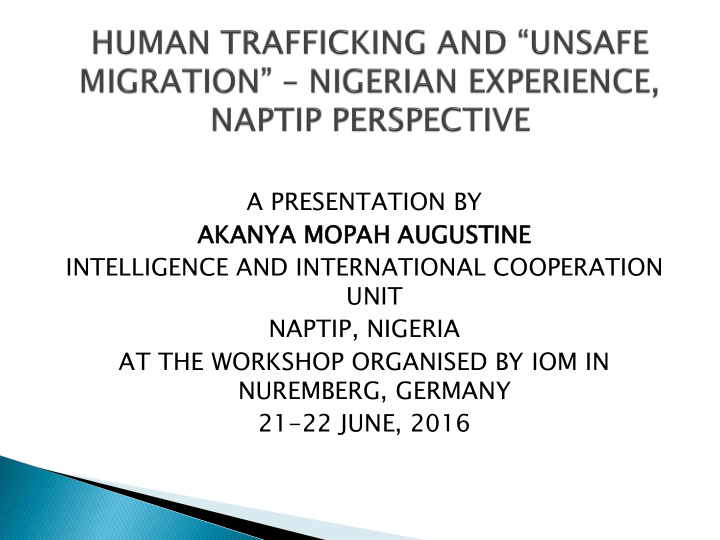



A PRESENTATION BY AKANYA YA M MOPAH AUGUS GUSTIN INE INTELLIGENCE AND INTERNATIONAL COOPERATION UNIT NAPTIP, NIGERIA AT THE WORKSHOP ORGANISED BY IOM IN NUREMBERG, GERMANY 21-22 JUNE, 2016
Nigeria, with an estimated population of about 170 million people and the rapidly growing youth population, has in recent years witnessed massive exodus of her citizens out of the Country. This is as a result of the employment driven nature of Nigerian emigration and the quest for social security and financial endowment in more developed regions. Nevertheless the declining economic prospects in some developing countries as well as stringent migrant and border controls, a large proportion of these persons have resorted to irregular means to enter developed nations.
Consequently, criminal elements have taken advantage of these gaps to traffick unsuspecting victims who are seeking better quality of life. Nigeria is not only a source country, but transit for migrants, as huge number of pe persons from the sub-region and Asian use Nigeria as their destination to seek economic bliss.
Many of these irregular movements occur via the Maghreb and Mediterranean coast with devastating consequences.
Most of the victims embark on ‘unsafe migration’ travelling by land nd through the desert, and substantial number die of thirst, hunger and physical exhaustion while oth thers rs fall victims of robbery attacks and rebel activities during the journey.
Human trafficking has negative consequences on individuals, mainly the victims and the society in general, (per ersona nal and socie cietal risks) It violates the human rights of its victims; It is degrading and dehumanizing; Social and emotional trauma
Health risks (both physical and mental), sicknesses and diseases contacted during trafficking; injuries as a result of direct assault from traffickers; psychological and mental trauma. Intimidation, coercion, abduction, fraud, deception, threats and assaults, which may result in death of victims, their families or friends. Spread of STDs, HIV AIDS etc; It promotes other types of crimes like Money laundering, drug trafficking and arms smuggling
Forced or bonded labour Child labour Forced prostitution Exploitative Labour and other forms of exploitation Slavery or slavery-like activities Removal of organs
Interviews with victims NGO’s Clients Product of enquiries Previous Intelligence Surveillance Exchange of Information
Number of reported cases of Human Trafficking (HT) Number of confirmed incidences of HT Types Exploitation Number of International and Domestic Incidents Number of Victims rescued Gender of victims Age of victims Number of Prosecutions and Number of convictions
160 145 140 127 Reported 120 100 91 85 ber 82 Numbe 80 60 42 40 32 30 27 26 17 16 15 20 9 8 6 6 5 2 1 1 0 0 Typ Types o of Cas Cases
Although NAPTIP is mandated to coordinate (collect and collate) data on Human Trafficking in Nigeria, there is currently no reliable, unified platform (database) to achieve accurate data. Statistics are reported on ad-hoc basis by stakeholders Some state and non-state actors are not willing to share information. Difficulty in the iden denti tificati ation on of Trafficked victims: authorities do not always recognize trafficked persons as victims and often mistake them for irregular migrants (human smuggling), professional sex workers or migrant labour.
Lack of awareness surrounding the issue of undereporting. Victims are deported while the traffickers are left behind in Europe Reluctance of victims to report their victimization. Failure to notify NAPTIP (the coordinating Agency) on repatration of trafficked victims.
The significance of trans-national cooperation in information exchange is desirable and a necessary antidote in the total annihilation of human trafficking. Creation and maintenance of a National database to manage data scattered across organizations and departments. Information on repatriation of trafficked victims should be consistently shared with NAPTIP by the repatriating authorities (perhaps, through their Embassies/Consulates). Capacity building on identification of trafficked victims.
So far, NAPTIP secured conviction of over 270 270 traffickers, rescued over 9000 9000 victims and empowered over 700 700 of the victims since its inception. Migration, when it is “safe” e”, legal and voluntary is the oldest poverty reduction and human development strategy. Indeed, it is a veritable tool for the eradication of poverty that could enhance socio-economic development. To this end, a well structured and organised migration that will entail quota allocation could encourage the employment of a number of skilled Nigerians abroad in a more regular and legal manner.
THANK YOU FOR LISTENING
Recommend
More recommend